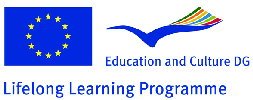

|
|
|
Key Activity 2 Languages Multilateral Project - Ref. 135699-LLP-1-2007-1-BG-KA2-KA2MP
Website address: www.russianonline.eu
Learning languages is becoming increasingly important in the European Union and there is a need for sustained efforts to improve the linguistic competences of the European population both in the official languages of the EU and the languages of global communication. Russian language is one of the six official and working languages of the United Nations and according to the published statistics takes the 5th place in the world as it is spoken by 285 million people. Among them 160 million people consider Russian their native language putting it at the 7th place in the world by the number of native speakers. In Europe teaching Russian is primarily offered by the formal education system (schools and universities) while the opportunities to learn Russian within non-formal education or adult training system are very few.
Taking into consideration that the flow of Russian speaking people (tourists or frequent business visitors), including inhabitants of new EU members, is constantly growing, this project seeks to make its contribution through the development of a basic online training in Russian. This online course will be addressed to staff working in hotels, restaurants and recreation industry as well as people providing home accommodation or living in the regions where tourism is particularly important. It will give them an opportunity to acquire or enhance language competence. The developed training will be also useful for owners of small and medium business establishing and developing business contacts with Russian-speaking partners.
The project seeks to analyze the experience of teaching Russian in the 4 countries participating in the project, to identify good practices that can be applied in the modern language learning context and to create a basic online course suitable for use in various domains (self-study, vocational and language schools, staff qualification courses). The developed training will improve the language skills of people engaged in the recreational field and the employability chances of young adults wishing to work in this area.
This project also supports the development of innovative ICT-based content, services, pedagogies and practice for lifelong learning, as it envisages the development of an online course and encourages adults of various age groups to use ICT to facilitate their learning and make it more attractive and flexible considering their individual professional or/and personal needs.
The main activities of the project, planned for two years (2008-2009), will be:
1. Creation of the project website, which will consist (presumably) of three main parts:
- Information - general info about the project for wider public, objectives, partners and results of the project, dissemination events;
- Restricted access zone - for the project partners - working plan, reports, documents related to the project management and other working documents;
- Learning zone - Online Russian language course
2. Development of the learning content:
- Analysis of existing successful practices and learning materials with the view of adopting positive experience in the project's developments
- Setting methodology, approach and structure of the course
- Defining the level and language competences that the users of the course would acquire in the context of the Common European Framework of Reference for Languages
- Elaboration of learning units - themes, vocabulary, grammar content, drills taking into consideration the online concept of the course
- Translation of the course content into the partners' languages
- Technical analysis of the linguistic input and defining technical specifications and requirements; development of software and graphic design; development of beta version of the course
- Testing of the beta version
3. Piloting in the partners' countries:
- Choosing suitable audience for piloting (hotel and restaurant schools and training centres etc.)
- Development of piloting schedule
- Piloting feedback and evaluation
- Improvement and finalizing of the product
4. Development of intercultural training elements (e.g. what we need to know to communicate with Russian speaking people, how to avoid cultural misunderstandings etc.) Uploading to the project website.
5. Development and implementation of dissemination strategy.
Website in 5 languages (the languages of the partners + Russian) as a tool for dissemination and coordination of the project
Online Course (website)
Piloting & evaluation.
The project is undertaken as a multinational partnership including institutions from 4 European countries: Bulgaria, Italy, Malta and Spain:
Euroinform Ltd - Sofia, Bulgaria - the coordinating institution deals with consulting services related to foreign language, vocational training and introduction of modern training methods for learners with visual disabilities. Euroinform is also engaged in translation and adaptation of learning and teaching tools and materials. The company coordinated several Socrates projects (Lingua, Grundtvig) and participated as a project partner in many EU-funded projects (Socrates, Leonardo da Vinci, etc). The company has a particular experience in design and delivery foreign language teaching, including interactive language courses. Its 'Listen and Touch' project (Lingua 2) has been awarded the European Language Label and selected among the 50 European good practices motivating language learning. Euroinform is also involved in a number of initiatives related to the language promotion, e.g. Read It Easy project, raising awareness of Bulgarian and Greek alphabets.
Educational Programmes Consult - Ltd - EPC - Sofia, Bulgaria - is an educational organization, owner of Sofia City School of foreign languages, incl. Russian. The company is expert in implementation of EU projects in language education and in VET and application of the European Framework for Language Reference in Bulgaria, especially in Russian and English language teaching via its language school and with its experience in development of educational materials and language readers in these languages. EPC develops and implements modern educational methodologies and strategies supported by ICT in educational institutions and SMEs through integration of language content into vocational training. The language programmes the organisation elaborates are usually in English, Russian, Greek and Bulgarian. The company's staff has a practical knowledge of the target sector in BG, and the problems speakers of the non-Cyrillic Alphabets usually have with it, one of them being Russian.
Federazione Nazionale Insegnanti Centro di iniziativa per l'Europa - FENICE - Naples, Italy - is a non-profit teacher's association. During 26 years of activity, with the aim to increase the European dimension in education; to promote and plan initiatives, training projects, refresher courses, the cultural improvement of teachers as well as research and experimentation in the teaching field, it designed and carried out more than 30 seminars and public conferences, 135 in-service courses and training courses for teachers both initial and in-service, most of which had been authorised by our local educational Authorities. FENICE will analyze the experience of teaching Russian in Italy, identify good practices that can be applied in the modern language learning context and will cooperate in defining the concept and structure of a basic online course suitable for use in various domains (self-study, vocational and language schools, staff qualification courses). FENICE will test the product with pilot users in order to verify their applicability in the educational practice and will participate to the evaluation of the results.
AcrossLimits - Hamrun, Malta - is a dynamic commercial entity with its roots firmly derived from the new technology and media sector. In fact its core business is centred around the areas of e-business, internet and knowledge management solutions for Small and Medium Enterprises. However in the last years, AcrossLimits has diversified and now is made up of 3 main divisions, namely Technology, European projects and Education. In this project the company will be in head of the website development and technical implementation of the envisaged online course. The company will also arrange for testing of the product in Malta.
University of Granada - UG - Spain - is usually referred to as one of the "classical" universities and ranks among the top five universities of the 52 that exist in Spain today. The UG has had a long experience in coordinating and participating in projects Tempus PHARE and TACIS. The university provides teaching of Russian language and will take part in the development of the textual content of the product. The person in charge of the university activities, Rafael Guzman Tirado, is an author of a number of works and books directly related to teaching Russian as a foreign language.